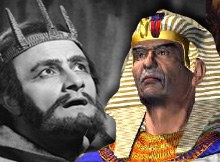Bo: Pharaoh and Macbeth

Exodus 10:1–13:16
Our parashah begins: "God said to Moses: 'Come to Pharaoh, for I have hardened his heart and the heart of his servants in order to place these signs of mine in his midst.'" Indeed, this motif of the hardened heart already appeared in last week's portion and recurs nearly a dozen times in the context of the ten plagues. The problem, however, is this: If Pharaoh and the Egyptians were denied free will in their dealings with Moses, how can their subsequent punishment be justified?
The first to raise this question was the talmudic sage, Rabbi Yohanan, who observed that "this verse offers an excuse to heretics to argue that God denied them the opportunity to repent." His colleague (and intellectual sparring partner), Reish Lakish, responded by observing that only after Pharaoh had established a pattern of obstinacy by hardening his own heart five times does God then proactively cause it to remain hardened.
The locus classicus of the discussion of theodicy remains the Code of Maimonides (1138–1204), and in particular the Laws of Repentance (Chapter 6). Maimonides' explanation is that unrestricted access to repentance would thwart the purpose of justice, which is to see criminals punished for their crimes.
There are numerous verses in the Torah and the Prophets that appear to contradict this principle [i.e., free will] and many people stumble over them, imagining that God coerces people to do evil or good and that man is not in control of his own actions . . .
It can transpire that someone will commit an egregious sin, or many sins, to such an extent that justice requires of the true judge [i.e., God] that in order to make him pay the penalty for his voluntary and deliberate crimes He must withhold from him the opportunity to repent from his evil ways in order that he may die and perish on account of his wickedness . . .
It therefore says in the Torah, "I shall harden Pharaoh's heart" because he initiated his evil actions by himself and caused harm to the Israelites dwelling in his land . . . Justice therefore required that he be denied repentance until retribution was exacted from him. That is why God hardened his heart.
In a kindred spirit, Joseph Albo (Spain; 1380–1444), author of Sefer Ha-Ikkarim (The Book of Principles), another classic of Jewish philosophy, explains that hardening Pharaoh's heart not only does not curtail his free will but—on the contrary!—it permits its unencumbered exercise.
When a stricken villain turns righteous and repents on account of his punishment, like Pharaoh who admitted "I have erred this time; God is righteous" (9:27), this may appear to be the result of coercion rather than volition. God therefore hardens his heart by suggesting that the blow he suffered was the result of coincidence rather than providence . . . With the specter of punishment removed, he is able to exercise his true will without compulsion.
The moderns, however, take a different approach. S.D. Luzzatto (Italy; 1800–1865) explains that hardening Pharaoh's heart is not a denial of free will at all, but a literary device that exaggerates the extent to which his self-imposed stubbornness defies rational comprehension.
Those particular activities that are directly attributed to God in the Bible constitute unusual deeds whose causes elude us. Thus, Pharaoh's stubbornness—even after he had witnessed several signs and wonders—is enigmatic and incomprehensible [to us], and is therefore attributed to God.
M.D. Cassuto (Italy-Israel; 1883–1941), like Reish Lakish, notes that the Torah alternates the active "God hardened Pharaoh's heart" (7:3; 9:12; 10:20) with passive statements like "Pharaoh's heart was hardened" (7:13, 22, etc.) and even, "Pharaoh hardened his own heart" (8:28). He compares this circumlocution to such biblical expressions as the description of a barren woman as, "God had sealed her womb" (i.e., Hannah, cf. 1 Samuel 1:5), or a fatal accident as, "God made it befall him" (Exodus 21:13), explaining:
Anything with multiple causes . . . is attributed by the Israelite outlook to the will of God, the ultimate cause . . .
While the philosopher traces the long and complicated chain of causation, the simple man jumps immediately to the original cause and attributes it directly to God. Such is the Torah, which speaks in the language of simple folk.
Nehama Leibowitz (1905–1997), whose knowledge encompassed world literature as well as Judaic erudition, calls our attention to a passage in Shakespeare's Macbeth (III.ii.56): "Things bad begun make strong themselves by ill," and cites an interpretive essay by D. Cunningham in Shakespeare Quarterly (1963):
Gradually he so hardens himself in the custom of evil that he becomes eventually incapable of altering the pattern in which his very being is fixed . . .
The heart is so encumbered by the burden of its own fulfilled desires, that it cannot be turned away from there.
Macbeth, like Pharaoh, so persevered in his own evil as to become inured to it, and foreclosed on his own options for change and repentance.
Moshe Sokolow, professor of Jewish education at the Azrieli Graduate School of Yeshiva University, is the author of Studies in the Weekly Parashah Based on the Lessons of Nehama Leibowitz (2008).
Comments are closed for this article.




